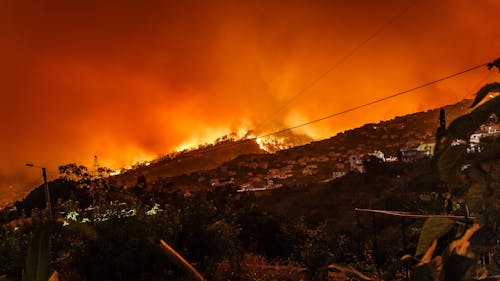KOLI: 'Hunger Games' or reality?
Column: Talk More

Most people consider the popular book series "The Hunger Games" to be far removed from our reality. But considering the current situation of the world, a dystopian future would not be that surprising.
The world of "The Hunger Games," created by author Suzanne Collins, is both haunting and complex. Panem, a future country situated in North America, is divided into 12 working-class districts overseen by the Capitol, which consists of society's wealthiest individuals.
Children from the districts are forced to participate in the Hunger Games, in which one male and one female tribute are chosen from each district to fight the rest of the tributes to the death. The last individual remaining is crowned the victor.
The act of forcing children to kill each other is a source of amusement for the Capitol — something they look forward to celebrating every year. These citizens have been desensitized to violence and abuse.
This same desensitization and insensitivity is present in today's society. For instance, in 2018, popular influencer Logan Paul filmed a clip of a deceased person and posted the footage online. This was both inconsiderate and insensitive because the individual had a life and family, and Paul had no regard for their privacy or feelings.
To make matters worse, his audience, composed of children and teenagers, watched the video. Videos like these are circulated around the internet and desensitize children to violent and graphic images. Despite the criticism that Paul faced, he still profited off of the loss and pain of others.
In today's world, photos and videos of significant historical events, such as the terrorist attacks on 9/11, are plastered all over the internet. Children grow up continuously seeing these live accounts of history, which may cause them to be less likely to react emotionally over time.
Moreover, violence and gore in video games and movies add to this desensitization because children may not realize the emotional impact and trauma these topics can leave on an individual.
In Collins' book and the movie franchise, children born in Panem's wealthier districts tend to be more aggressive and confident in their fighting abilities. Growing up training for the Hunger Games, they do not see an issue with the violence and gore involved.
Meanwhile, children who are unfortunate enough to be born anywhere other than the Capitol are forced to suffer due to the society they are brought up in. Children from the poorer districts have even fewer resources with which to learn to defend themselves from the cruelty of the Hunger Games.
Over the years, the planet has faced many natural disasters, including frequent earthquakes in Afghanistan, major rainforests like the Amazon catching fire, wildfires in Canada and the U.S. and droughts in the U.S.
As the world experiences more of these disasters, a post-apocalyptic world like Panem seems more like a reality, especially if people continue to destroy the environment around them.
Poor and underprivileged cities in the world today mirror those of Panem. New York City is a major city in the U.S. that contains both a large percentage of poverty-stricken neighborhoods as well as affluent neighborhoods inhabited by billionaires.
Billionaires have the power to donate money and promote the welfare of these underprivileged areas in order to lessen the divide between the rich and the poor. But they choose to turn a blind eye due to greed.
The Capitol in "The Hunger Games" lives off of greed. It has a surplus of money, food and clothes, yet people in the Capitol choose to host these games, overlooking the poor conditions of other districts for their own benefit.
The dehumanization of people in the districts is similar to events in history where groups of people are segregated, put under unfavorable and cruel conditions and forced to do the labor that a small percentage of privileged individuals profit off of.
Dystopian stories like "The Hunger Games" are fascinating to people today due to the dark and mysterious world they portray to readers. We see young individuals rebel against authoritarian regimes and find hope in their efforts to change their flawed worlds.
It is ironic that people indulge in fictional post-apocalyptic worlds under the impression that they could never become a reality when, in fact, society is getting closer and closer to a dystopian future.
Vidhi Koli is a sophomore in the School of Arts and Sciences, where she is undecided. Her column, 'Talk More,' runs on alternate Tuesdays.
*Columns, cartoons and letters do not necessarily reflect the views of the Targum Publishing Company or its staff.
YOUR VOICE | The Daily Targum welcomes submissions from all readers. Due to space limitations in our print newspaper, letters to the editor must not exceed 900 words. Guest columns and commentaries must be between 700 and 900 words. All authors must include their name, phone number, class year and college affiliation or department to be considered for publication. Please submit via email to oped@dailytargum.com by 4 p.m. to be considered for the following day's publication. Columns, cartoons and letters do not necessarily reflect the views of the Targum Publishing Company or its staff.



